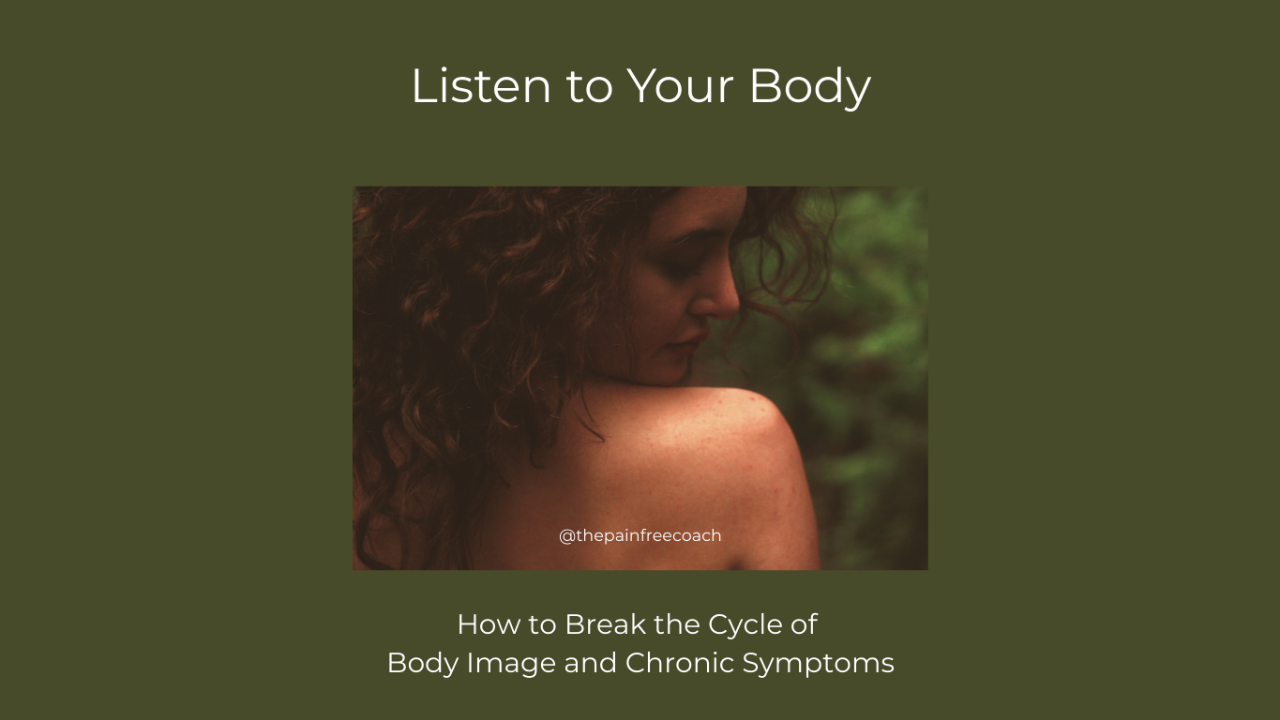Listen to Your Body: How to Break the Cycle of Body Image and Chronic Symptoms

So many women come to me saying they feel betrayed by their bodies. Maybe pain has kept you from exercising, or stress has led to emotional eating. Maybe you’ve tried every diet, only to feel frustrated and disconnected, feeling ashamed every time you look in the mirror.
What if the missing piece isn’t more discipline, stricter rules, or another diet plan… but learning to listen to your body?
Why Listening to Your Body Matters
Your body is constantly sending signals: hunger and fullness cues, tension that says you need rest, or even cravings that show your nervous system needs comfort. But when we’ve been taught to criticize or control our bodies, we often silence those signals.
This disconnection can show up in different ways:
-
Eating past fullness because you’re stressed or checked out
-
Ignoring hunger cues because you “shouldn’t be hungry yet”
-
Overriding pain and pushing through exercise until you feel worse
-
Feeling numb or disconnected (a freeze response from the nervous system)
When we can’t listen to the body, it’s almost impossible to feel at peace in it.
Weight Loss and Body Connection
It’s okay to want to lose weight. Many women feel this way because they want more energy, less pain, and confidence in their bodies. But the way you pursue weight loss matters.
When it’s fueled by self-criticism and things like restricting, over-exercising, and ignoring your body’s needs, it creates more stress and disconnection. That stress itself can keep weight on, intensify pain, and make you feel like you’re failing.
When it’s fueled by listening to your body, eating in response to hunger, stopping at fullness, moving in ways that feel supportive, and calming your nervous system, you not only support long-term, natural, and sustainable weight loss, but also rebuild trust with yourself.
How Trauma and Stress Disrupt This Connection
If you’ve lived through trauma or carry high stress, your nervous system may make listening to your body harder:
-
Freeze response: You feel numb, disconnected, or unaware of how much you’re eating.
-
Fight-or-flight response: You rush through meals or eat on the go, leaving no space to notice fullness.
-
Chronic stress: Food becomes a way to self-soothe when emotions feel too big.
Understanding these patterns helps you see that your struggles are not your fault. They are protective responses. And with the right tools, they can shift.
Practices to Help You Listen to Your Body Again
1. Somatic Exercise
Spend a few quiet minutes each day noticing sensations in your body: warmth, tension, heaviness, or lightness. No judgment, no need to change it, just curiosity.
2. Body Image Affirmations
Try affirmations like:
-
My body is wise, and I am learning to listen.
-
It is safe for me to respond to my hunger and fullness.
-
Every breath reconnects me with my body’s wisdom.
These gentle reminders help rewire your inner voice from criticism to compassion.
3. Mindful Eating
Before meals, pause. Notice the colors, smells, and textures of your food. Chew slowly, and check in with your body halfway through: Am I still hungry, or am I satisfied?
4. Nervous System Regulation
Movement, breathing, or grounding practices help your nervous system feel safe, making it easier to hear and respond to your body’s cues.
The Hope: You Can Heal
Listening to your body isn’t about perfection. It’s about building trust one small step at a time. When you soften your inner voice, honor your body’s cues, and respond with compassion, you’ll discover something powerful: Your body has always been on your side.
It’s okay to want to lose weight. It’s okay to want less pain. But the most sustainable, life-giving path isn’t about controlling or punishing your body, it’s about listening to it.
If you want to explore how this work applies to your unique story, I’d love to invite you to schedule a free call.
Every woman’s nervous system, weight loss journey, and symptoms are different, and this is deeply personal work.
Together, we can start to untangle the patterns that are holding you back and create new ones that support healing.
I believe in you,
💙 Katie

